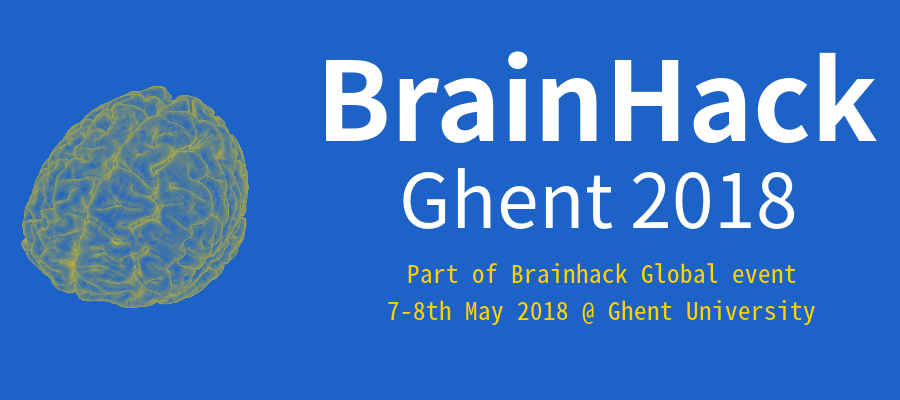
Registration for Brainhack Ghent 2018 is NOW open!
!! REGISTRATION DEADLINE: 1st of May - EXTENDED till 5th of MAY, 12pm !!
On 7-8th May 2018, the second edition of Brainhack Ghent will take place as part of the Brainhack Global event. During this two-day event dedicated to students and PhD students, we will work in teams on neuroscience-related projects.
The aim of the event is to collaborate on projects, meet new researchers, make new friendships in academia, learn, share the knowledge on data mining and brain research, but also promote open science in the spirit of the whole Brainhack community (Craddock et al., 2016). Attendees of various backgrounds are welcome to join!
By submitting your research project or contacting us about a tutorial you can gain a priceless leadership experience as you will work with and manage a group of researchers at our two-day event.
Please send all related questions to the mailing address: brainhackghent2018@gmail.com
Also, please team up with us! Join our slack #bhg-ghent2018 channel Brainhack Slack for updated information on the developing Hackathon content and to contribute your own ideas.
Preliminary schedule
IMPORTANT:
On both days the main ‘Brain Hacking’ room will be LESZAAL 2.1 (2nd floor; FPPW).
Please gather there for the Welcome talk on the first day of the Brainhack event (Monday, 7th May 2018).
|
|
Monday, 7th May 2018 |
Tuesday, 8th May 2018 |
|
9:00 – 10:00 |
Welcome Project Pitches + Team Organization |
Brain Hacking |
|
10:00 – 11:00 |
Brain Hacking |
Brain Hacking |
|
11:00 – 12:00 |
Brain Hacking |
Brain Hacking |
|
12:00 – 13:00 |
Lunch |
Lunch |
|
13:00 – 14:00 |
||
|
14:00 – 15:00 |
Brain Hacking |
Brain Hacking |
|
15:00 – 16:00 |
Brain Hacking |
Brain Hacking + Finalizing Projects |
|
16:00 – 17:00 |
Brain Hacking |
Project Presentations |
|
17:00 - ... |
Brain Hacking + Dinner |
Optional Brain Hacking |
Projects – to be continued
Click here to register!
Click here to submit your own project!
♥ Meet your expert (Q&A) ♥
For all those who have a specific question about an fMRI/EEG/... dataset, a specific analysis they want to run, an error they got, ... and want to have the advice of an expert:
You can submit your question at brainhackghent2018@gmail.com with the subject line: 'Q&A - Brainhack Ghent 2018' and we will try to find an expert within that field to answer your question. While submitting your question, please specify your name and the field in which your question is situated.
Keywords:
- neurofeedback/EEG
- container/reproducibility
- haemodynamic response function/rest&task-fMRI
- source localization and connectivity/EEG
- pre-processing/EEG
- 3D printing/T1 MRI image
|
1 |
Project Title |
Analyzing neurofeedback - EEG data |
|
Author(s) |
Wouter Devos, Master student in Physics, University of Ghent |
|
|
Provided data: |
||
|
2 |
Project Title |
Building a container for reproducibility |
|
Author(s) |
Hannes Almgren, PhD student, University of Ghent |
|
|
Aim: |
||
|
3 |
Project Title |
Relating rest and task fMRI HRF parameters |
|
Author(s) |
Frederik Van de Steen, PhD student, University of Ghent |
|
|
Aim: |
||
|
4 |
Project Title |
Playing with the Berlin Brain Connectivity Benchmark and Data Analysis Challenge (challenge from last year) to get some familiarity with source localization and connectivity in EEG data |
|
Author(s) |
Iege Bassez, Kate Ergo and Davide Gheza, PhD students, University of Ghent |
|
|
Aim: |
||
|
5 |
Project Title |
Pre-processing of (resting state) EEG data of chronic pain patients |
|
Author(s) |
Dorine Lenoir, PhD student, University of Ghent |
|
|
Aim: |
||
|
6 |
Project Title |
Fun side project to explore: How to 3D print our own brain from a T1 MRI image |
|
Author(s) |
Sofie Van Den Bossche, PhD student, University of Ghent |
|
|
Aim: |
||
Flash talks
Click here to see the complete preliminary schedule.
|
Monday, 7th May 2018: 13.00–14.00 |
|
|
Talk 1
|
Topic: Meta-analysis Speaker(s): Han Bossier and Freya Acar |
|
Talk 2 |
Topic: Science communication Speaker(s): Ineke Imbo |
|
Tuesday, 8th May 2018: 13.00–14.00 |
|
|
Talk 1 |
Topic: fMRI – Arterial Spin Labeling (ASL) Speaker(s): Patricia Clement |
|
Talk 2 |
Topic: Information theory Speaker(s): Daniele Marinazzo |
Register as a Brainhack project participant
Registration for Brainhack project participants is NOW open.
!! REGISTRATION DEADLINE: 1st of May - EXTENDED till 5th of MAY, 12pm !!
We welcome people from differents background! We will do our best to make sure that everyone can take part in the project they like, and that the projects are well prepared for. So don’t hesitate to come and enjoy this event!
Attendance is free. For those who want to have food provided, so they can eat together during the event without having to run to a shop themselves, we will be collecting a small fee later (amount depending on the choice of food).
Submit a project
!! REGISTRATION DEADLINE: 1st of May - EXTENDED till 5th of MAY, 12pm !!
Please fill out the form below to submit a project for the Brainhack. Concretely, you have to specify the project author, a project title, and a short project outline specifying some scientific context and concrete goals. Of course, you’re always welcome to provide that extra bit of information to help your fellow Brainhackers in their project selection process! For example, you can provide 1-3 key papers related to the project, some requirements (e.g. certain programming skills) for taking part in the project, skills and competences that can be learned in the project…
Submission of projects in advance of the Brainhack is warmly welcomed.